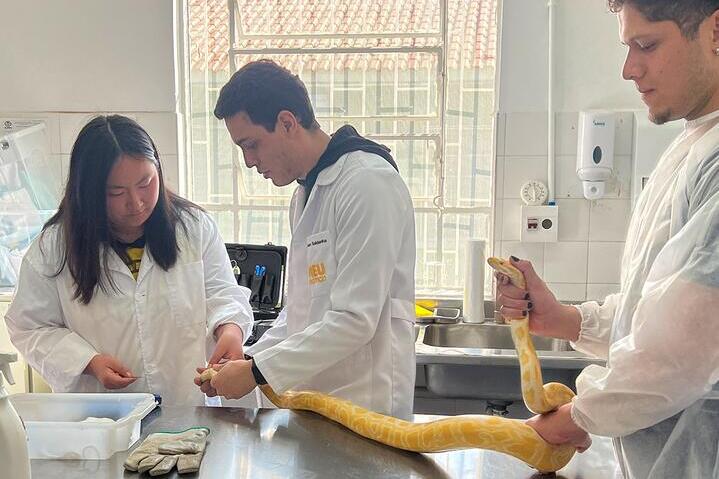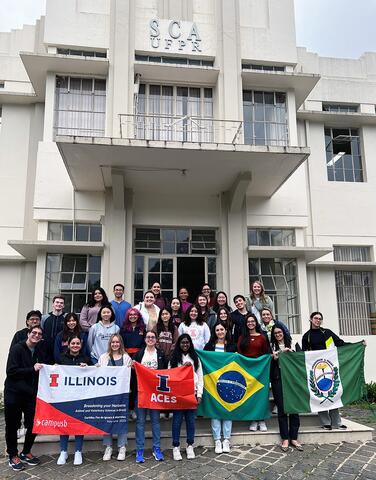Wildlife wonders: U of I students thrive in Brazil study abroad program

URBANA, Ill. — For University of Illinois Urbana-Champaign sophomore Joe Del Rio, getting up close and personal with South America’s wildlife this summer was a dream come true. The animal sciences major jumped at the chance to join a new College of Agricultural, Consumer and Environmental Sciences (ACES) study abroad program offering a professional and cultural immersion in animal and veterinary sciences in Paraná, Brazil.
Maria Cattai de Godoy, associate professor in the Department of Animal Sciences at U. of I., built the program in conjunction with her colleague, Ananda P. Felix, associate professor in the Department of Animal Sciences at Federal University of Paraná (UFPR) at Curitiba. A native Brazilian herself, Godoy wanted to expose students to the diverse wildlife, landscapes, and cultures of her country and to disciplines in the animal and veterinary sciences not typically available to Illinois students.

The two-week adventure began with an intensive hands-on rotation working with professors and graduate students at the UFPR veterinary hospital, where students learned technical skills in cardiology and imaging. The group, which included 20 students from ACES and the College of Liberal Arts & Sciences, also traveled across the region and learned to identify birds at an avian conservation sanctuary, observed how antivenom is produced from Brazil’s venomous snakes, and learned about sustainable aquaculture and wildlife conservation. Along the way, the students were treated to sights and flavors unlike any they had experienced before.
“One night, some friends and I decided to run out into the Atlantic Ocean, right outside our hotel. When we surfaced, one of my friends mentioned how salty the water was. It surprised him because it was his first time going into an ocean,” Del Rio said. “With how perfect the temperature and scenery were that night, that must have been the best first impression of swimming in the ocean that one could have. It made me enjoy the moment more because I realized we will remember these two weeks for the rest of our lives.”
Vanessa Salgado, now in her first year at the U. of I. College of Veterinary Medicine, was an experienced traveler before the trip. But Brazil’s natural beauty still made a big impression.
“We traveled on the Serra Verde Express, a 4-hour train ride from the city of Curitiba to Morretes, with the most amazing views of the Atlantic Rainforest. Living in Illinois, it was beautiful to see what mother nature offers,” Salgado said. “Another breathtaking sight was visiting the city of Foz do Iguaçu, bordering Brazil, Argentina, and Paraguay. Here is one of the world’s largest waterfalls, Iguaçu Falls, where we had a perfect view of a 360-degree rainbow among rushing waterfalls. We also had the opportunity to go on a boat ride on the river and go under a waterfall!”
Godoy said the trip was eye-opening for each student in different ways, whether it was the beauty of the landscape or visiting no-cost universities, the norm in many other countries. But most importantly, students with a passion for wildlife conservation, veterinary medicine, or animal nutrition really got a feel for their future professions.
“The veterinary and wildlife rotations helped affirm my desire to follow the career pathway of a wildlife or zoo veterinarian,” Del Rio said. “It helped me realize that I want to find more hands-on experiences at UIUC because of the variety of work we got to learn about and sometimes partake in. This trip was also a great reminder of the amount of time and effort we’ll need to dedicate to vet school and why choosing to take those hard courses that go in-depth on the material during undergrad can benefit you in the long run.”
For Salgado, the experience made her feel more prepared to enter vet school when she returned to Illinois.
“I was enrolled in a bridge program to introduce incoming veterinary students to a variety of medical topics and participate in weekly problem-solving case discussions. A lot of the cases on small animals and wildlife touched upon my experience in the veterinary rotation at Brazil’s teaching hospital. For example, on our cardiology rotation, I learned about ECHO technology, a cardiovascular ultrasound that we saw conducted on a dog. During our imaging rotation, we learned how to take X-rays and how to interpret them, skills I used to better interpret cases during my discussion,” Salgado said. “Now that I’m in veterinary school, it’s nice to reflect upon my memories in Brazil and remember how exciting veterinary medicine can be outside the classroom and the different careers I can explore in the field.”

Considering the success of the first trip, Godoy plans to host it again in 2025.
Salgado encourages interested students not to rule out the trip, even if it seems out of reach. Identifying as underrepresented and low-income, Salgado said she initially thought study abroad trips were only available for more privileged students. But she learned about international scholarships that allowed her to travel abroad on three occasions during her undergraduate program.
“I encourage everyone to apply for scholarships if eligible. I would also tell students to be fearless, be open to trying different things, and be as engaged as possible with your study abroad program,” she said. “This was my third time traveling with a college group and each time I learned something new about myself. My biggest tip is getting comfortable with your peers; learning with a group is so much fun and makes it memorable for years to come.”
Students interested in the 2025 trip can reach out to Godoy at mgodoy2@illinois.edu. To learn more about studying abroad, identifying other travel opportunities, and applying for financial aid, students should contact ACES Study Abroad at aces-studyabroad@illinois.edu.